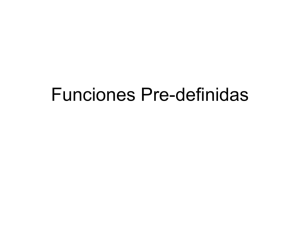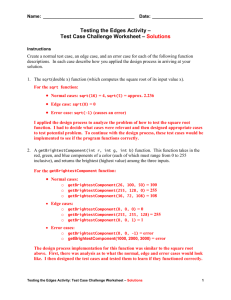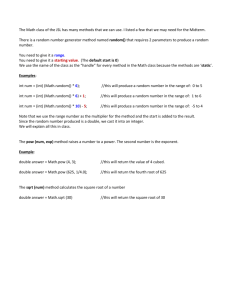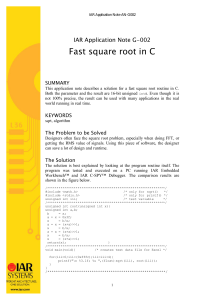LECTURE 8 Functions Part 2
advertisement
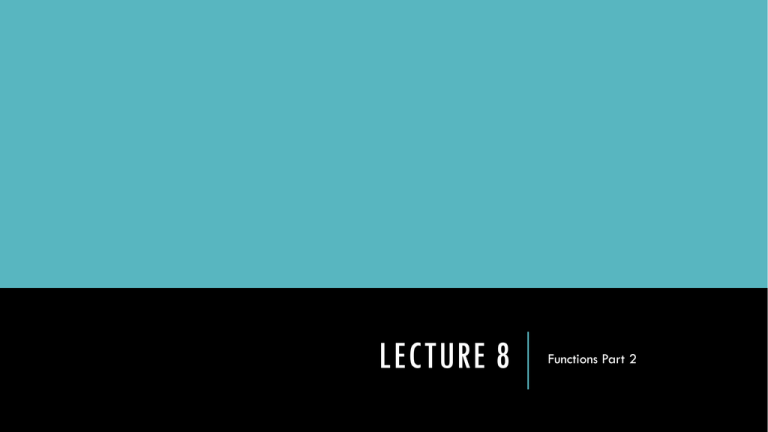
LECTURE 8
Functions Part 2
REVIEW OF FUNCTIONS
Last lecture, we introduced the concept of functions.
A function is a reusable portion of a program, sometimes called a procedure or
subroutine.
We can call a function like this:
functionName(argumentList).
double x = 9.0, y = 16.0, z;
z = sqrt(36.0);
// sqrt returns 6.0 (gets stored in z)
z = sqrt(x);
// sqrt returns 3.0 (gets stored in z)
z = sqrt(x + y);
// sqrt returns 5.0 (gets stored in z)
cout << sqrt(100.0);
// sqrt returns 10.0, which gets printed
cout << sqrt(49);
cout << sqrt(sqrt(625.0));
REVIEW OF FUNCTIONS
We can declare a function like this:
return-type function-name( parameter-list );
int Sum(int x, int y, int z);
double Average (double a, double b, double c);
bool InOrder(int x, int y, int z);
int DoTask(double a, char letter, int num);
double Average (double, double, double);
Usually, we put the declaration of the function above int main() and then we put the
definition of the function below int main().
REVIEW OF FUNCTIONS
To define a function:
return-type function-name( parameter-list )
{
declarations and statements
}
To return a value from the function:
return expression;
REVIEW OF FUNCTIONS
int Sum(int x, int y, int z)
{
int answer;
answer = x + y + z;
return answer;
}
// add the three parameters together and return the result
double Average (double a, double b, double c) // add parameters, divide by 3, return result
{
return (a + b + c) / 3.0;
}
SCOPE OF IDENTIFIERS
The scope of an identifier (i.e. variable) is the portion of the code where it is valid and usable.
A global variable is declared outside of any blocks, usually at the top of a file, and is usable
anywhere in the file from its point of declaration.
• "When in doubt, make it global" == BAD PROGRAMMING PRACTICE.
• Best to avoid global variables (except for constants, enumerations).
• Function names usually global (prototypes placed at the top of a file, outside any blocks).
SCOPE OF IDENTIFIERS
A variable declared within a block (i.e. a compound statement) of normal executable
code has scope only within that block.
• Includes function bodies.
• Includes other blocks nested inside functions (like loops, if-statements, etc).
• Does not include some special uses of block notation to be seen later (like the
declaration of a class -- which will have a separate scope issue).
SCOPE OF IDENTIFIERS
Variables declared in the formal parameter list of a function definition have scope
only within that function.
• These are considered local variables to the function.
• Variables declared completely inside the function body (i.e. the block) are also
local variables.
Example showing variables with different scopes
A trickier example. Be careful!
EMPTY PARAMETERS
Parameter lists
• Mathematical functions must have 1 or more parameters.
• C++ functions can have 0 or more parameters
• To define a function with no parameters, leave the parentheses empty
• Same goes for the call. (But parentheses must be present, to identify it as a function call)
RETURN TYPES
Return types
•
A mathematical function must return exactly 1 answer.
•
A C++ function can return 0 or 1 return value.
•
To declare a function that returns no answer, use void as the return type.
• A void function can still use the keyword return inside, but not with an expression
(only by itself). One might do this to force early exit from a function.
• To CALL a void function, call it by itself -- do NOT put it in the middle of any other
statement or expression.
EXAMPLES
Sample declarations:
char GetALetter();
// no parameters
void PrintQuotient(int x, int y);
// void return type
void KillSomeTime();
// both
Code example with definitions and calls for these functions.
Here’s an interesting void function – see if you can figure out what it does.
FUNCTIONS AND THE COMPILER
The reason for the declare-before-use rule is that the compiler has to check all
function CALLS to make sure they match the expectations.
•
•
•
•
The "expectations" are all listed in a function declaration.
Function name must match.
Arguments passed in a call must match expected types and order.
Returned value must not be used illegally.
Decisions about parameters and returns are based on type-checking.
• Legal automatic type conversions apply when passing arguments into a function, and when checking
what is returned against the expected return type.
Try this example – see if you can predict which calls the compiler consider legal and which are illegal.
